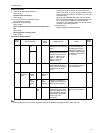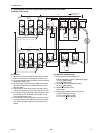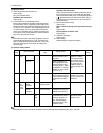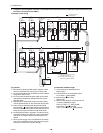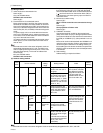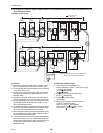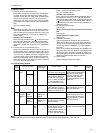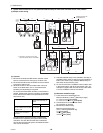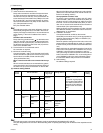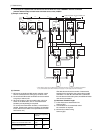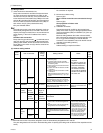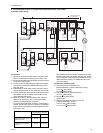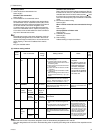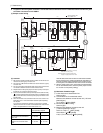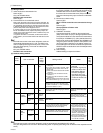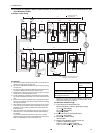
- 38 -
[ II Restrictions ]
GBHWE09080
(4) Wiring method
1) Indoor-heat source transmission line
Daisy-chain terminals M1 and M2 of the terminal block
for indoor-heat source transmission line (TB3) on the
heat source units (OC and OS), of the terminal block for
indoor-heat source transmission line (TB02) on the main
BC controller (BC), and of the terminal block for indoor-
heat source transmission line (TB5) on each indoor unit
(IC). (Non-polarized two-wire)
Only use shielded cables.
The heat source units in the same refrigerant circuit are
automatically designated as OC and OS in the order of
capacity from large to small (if two or more units have the
same capacity, in the order of address from small to
large).
Shielded cable connection
Daisy-chain the ground terminal ( ) on the heat source
units (OC and OS), the S terminal of the terminal block
(TB02) on the BC controller (BC), and the S terminal of
the terminal block (TB5) on the indoor unit (IC) with the
shield of the shielded cable.
2) Transmission line for centralized control
No connection is required.
3) MA remote controller wiring
Connect terminals 1 and 2 on the terminal block for MA
remote controller line (TB15) on the indoor unit (IC) to the
terminal block on the MA remote controller (MA).
(Non-polarized two-wire)
When 2 remote controllers are connected to the sys-
tem
When 2 remote controllers are connected to the system,
connect terminals 1 and 2 of the terminal block (TB15) on
the indoor unit (IC) to the terminal block on the two MA
remote controllers.
Set one of the MA remote controllers as a sub controller.
(Refer to the Instruction Manual for the MA remote con-
troller for the setting method.)
Group operation of indoor units
To perform a group operation of indoor units (IC), daisy-
chain terminals 1 and 2 on the terminal block (TB15) on
all indoor units (IC) in the same group, and then connect
terminals 1 and 2 on the terminal block (TB15) on the in-
door unit on one end to the terminal block on the MA re-
motecontroller. (Non-polarized two-wire)
When performing a group operation of indoor units that
have different functions, "Automatic indoor-heat source
addresssetup" is not available.
4) LOSSNAY connection
Connect terminals M1 and M2 on the terminal
block(TB5) on the indoor unit (IC) to the appropriate ter-
minals on the terminal block (TB5) on LOSSNAY (LC).
(Non-polarized two-wire)
Interlock operation setting with all the indoor units in the
same system will automatically be made. (It is required
that the Lossnay unit be turned on before the heat source
unit.)
When performing an interlocked operation of part of the
indoor units in the system with a LOSSNAY unit, using a
LOSSNAY unit alone without interlocking it with any
units, performing an interlock operation of more than 16
indoor units with a LOSSNAY unit, or connecting two or
more LOSSNAY units to the same refrigerant system,
the automatic address setup function is not available.
5) Switch setting
No address settings required.
(5) Address setting method
The heat source units in the same refrigerant circuit are automatically designated as OC and OS.
They are designated as OC and OS in the descending order of capacity (ascending order of address if the capacities are the
same).
Proce-
dures
Unit or controller
Address set-
ting range
Setting method Notes
Factory
setting
1 Indoor unit Main unit IC No settings
required.
- Port number setting is re-
quired
To perform a group opera-
tion of indoor units that fea-
ture different functions, the
automatic IC/OC address
setup function is not avail-
able.
00
Sub unit IC
2 LOSSNAY LC No settings
required.
-00
3MA
remote con-
troller
Main
remote con-
troller
MA No settings
required.
-Main
Sub
remote con-
troller
MA Sub
remote con-
troller
Settings to be
made with the
Sub/Main
switch
4 Heat source unit OC
OS
No settings
required.
-00
5 Auxiliary
heat source
unit
BC
controller
BC No settings
required.
-00



